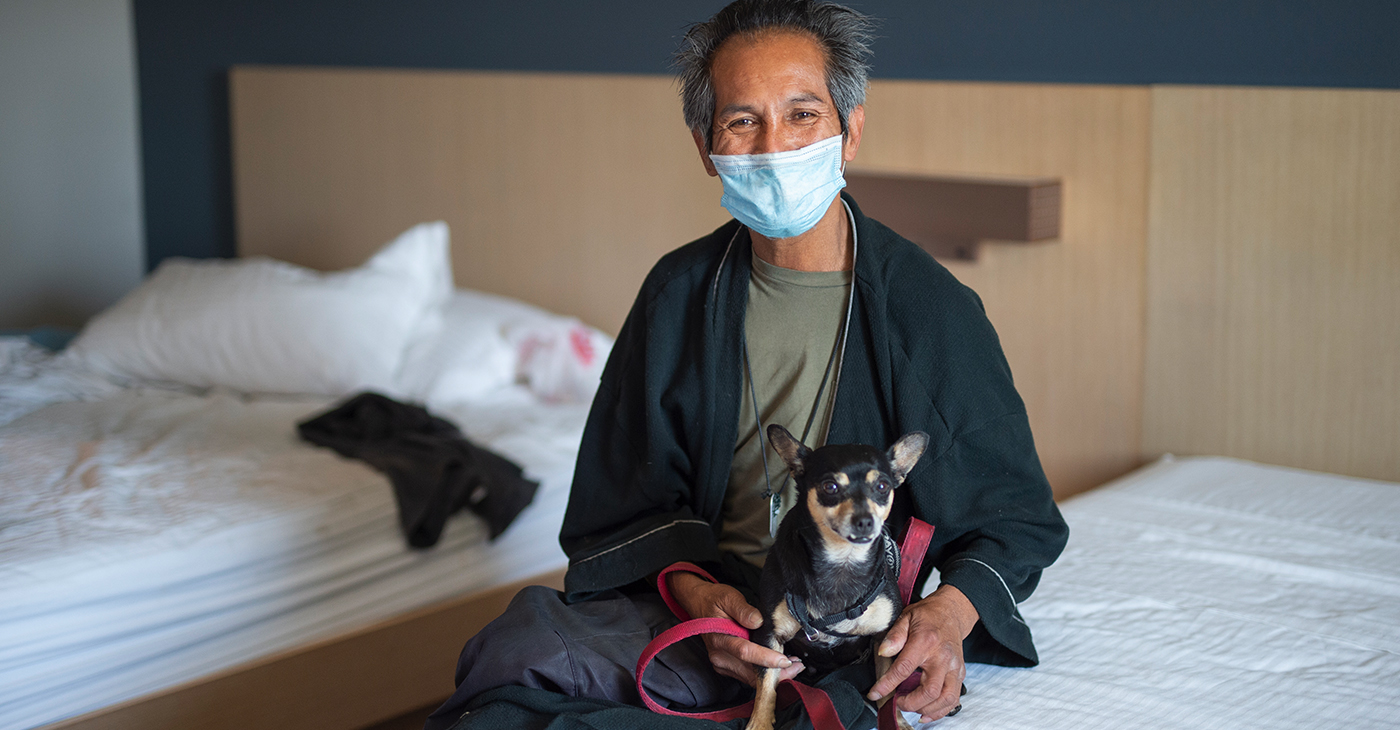Activism
More Changes for COVID-Related Rental Assistance
The County has aimed to speed up the assessment process and offer more transparency to the rental assistance work that has been underway since the initiation of the program in February 2021. Effective March 15, the County will close the waitlist for new applications to align with the State of California plan to close the state portal and prioritize applicants with incomes below 30% of Marin’s median household income and those who went the longest with unpaid rent. (Thirty percent of the median household income in Marin is $38,400 for individuals, $43,850 for households of two, $49,350 for three, and $54,800 for four.)

Supervisors approve agreements to improve financial allocation process
Courtesy of Marin County
Through February, the County of Marin had assisted 1,335 unique households by channeling federal and state funds into the hands of local tenants on the verge of eviction because of the COVID-19 pandemic and to landlords who experienced sudden income losses. In total, the County has paid out $21,549,174 in pandemic rental assistance.
Now, emergency aid will be distributed faster as the County increases staffing and improves the review process. It is adopting a software platform used by the State of California to distribute the remaining rental relief funds. On March 8, the Board of Supervisors approved agreements with two companies to assist with distribution of rental allocations in an efficient and compliant manner.
The County is entering into a $123,846 agreement with Neighborly Software for its subscription fee and data migration services and a $347,500 agreement with LiveStories to provide staffing for application intake and case management. The two firms will help the County administer its available balance of $11,636,249 earmarked to prevent evictions and homelessness related to COVID-19.
Since December, the County has distributed an average of $1.4 million in rental assistance per month. LiveStories has distributed more than $73 million in rental assistance funds in other jurisdictions. “The LiveStories team of trained and knowledgeable staff will augment the current rental assistance staff to distribute an additional $2 million per month in rent relief,” said Hyacinth Hinojosa, Deputy County Administrator.
The County has aimed to speed up the assessment process and offer more transparency to the rental assistance work that has been underway since the initiation of the program in February 2021. Effective March 15, the County will close the waitlist for new applications to align with the State of California plan to close the state portal and prioritize applicants with incomes below 30% of Marin’s median household income and those who went the longest with unpaid rent. (Thirty percent of the median household income in Marin is $38,400 for individuals, $43,850 for households of two, $49,350 for three, and $54,800 for four.)
The program has established multiple levels of review to ensure that applications meet eligibility criteria and the funds are spent to support the most vulnerable populations with the lowest income levels and those at risk of housing instability. The average time to approve a case once it reaches the final stage of review has been 30 to 60 days.
“We recognize that those most in need of pandemic related rental assistance are often those for whom barriers to access such a program are the highest,” Hinojosa said. “We work with our community partners to conduct outreach to those that need assistance with their applications including low income and non-English speaking populations.”
Clearing accumulated tenant debt is designed to provide a lifeline to the hardest-hit families and provide income stability for landlords. Landlords have legal freedom to pursue deferred unpaid rent, although state law requires landlords to demonstrate that they have applied for rental assistance and been denied. Once applicants living at 30% or below the county’s median income are served, staff will work to assist those living at 50% or below the median.
Since the end of the statewide eviction moratorium last fall, County staff has worked with nonprofit community partners to assure an equitable distribution of funds earmarked for eviction prevention during the pandemic. Several local agencies, such as Adopt A Family of Marin, Canal Alliance, Community Action Marin, North Marin Community Services, Ritter Center, St. Vincent De Paul Society of Marin, West Marin Community Services, and Women Helping All People.
Anyone needing help with the online application may call (415) 473-2223 or email staff to learn more about the Emergency Rental Assistance Program.
Property owners may call the District Attorney’s Consumer Protection Unit at (415) 473-6450 for assistance on rights and responsibilities. Renters are encouraged to contact Legal Aid of Marin at (415) 492-0230, extension 102, for inquiries on eviction protections.
Activism
Oakland Post: Week of April 24 – 30, 2024
The printed Weekly Edition of the Oakland Post: Week of April 24 – 30, 2024

To enlarge your view of this issue, use the slider, magnifying glass icon or full page icon in the lower right corner of the browser window. ![]()
Activism
Oakland Post: Week of April 17 – 23, 2024
The printed Weekly Edition of the Oakland Post: Week of April 17 – 23, 2024

To enlarge your view of this issue, use the slider, magnifying glass icon or full page icon in the lower right corner of the browser window. ![]()
Activism
Oakland Schools Honor Fred Korematsu Day of Civil Liberties
Every Jan. 30, OUSD commemorates the legacy of Fred Korematsu, an Oakland native, a Castlemont High School graduate, and a national symbol of resistance, resilience, and justice. His defiant stand against racial injustice and his unwavering commitment to civil rights continue to inspire the local community and the nation. Tuesday was “Fred Korematsu Day of Civil Liberties and the Constitution” in the state of California and a growing number of states across the country.

By Post Staff
Every Jan. 30, OUSD commemorates the legacy of Fred Korematsu, an Oakland native, a Castlemont High School graduate, and a national symbol of resistance, resilience, and justice.
His defiant stand against racial injustice and his unwavering commitment to civil rights continue to inspire the local community and the nation. Tuesday was “Fred Korematsu Day of Civil Liberties and the Constitution” in the state of California and a growing number of states across the country.
One OUSD school is named in his honor: Fred T. Korematsu Discovery Academy (KDA) elementary in East Oakland.
Several years ago, founding KDA Principal Charles Wilson, in a video interview with anti-hate organization “Not In Our Town,” said, “We chose the name Fred Korematsu because we really felt like the attributes that he showed in his work are things that the children need to learn … that common people can stand up and make differences in a large number of people’s lives.”
Fred Korematsu was born in Oakland on Jan. 30, 1919. His parents ran a floral nursery business, and his upbringing in Oakland shaped his worldview. His belief in the importance of standing up for your rights and the rights of others, regardless of race or background, was the foundation for his activism against racial prejudice and for the rights of Japanese Americans during World War II.
At the start of the war, Korematsu was turned away from enlisting in the National Guard and the Coast Guard because of his race. He trained as a welder, working at the docks in Oakland, but was fired after the bombing of Pearl Harbor in 1941. Fear and prejudice led to federal Executive Order 9066, which forced more than 120,000 Japanese Americans out of their homes and neighborhoods and into remote internment camps.
The 23-year-old Korematsu resisted the order. He underwent cosmetic surgery and assumed a false identity, choosing freedom over unjust imprisonment. His later arrest and conviction sparked a legal battle that would challenge the foundation of civil liberties in America.
Korematsu’s fight culminated in the Supreme Court’s initial ruling against him in 1944. He spent years in a Utah internment camp with his family, followed by time living in Salt Lake City where he was dogged by racism.
In 1976, President Gerald Ford overturned Executive Order 9066. Seven years later, the 9th Circuit Court of Appeals in San Francisco vacated Korematsu’s conviction. He said in court, “I would like to see the government admit that they were wrong and do something about it so this will never happen again to any American citizen of any race, creed, or color.”
Korematsu’s dedication and determination established him as a national icon of civil rights and social justice. He advocated for justice with Rosa Parks. In 1998, President Bill Clinton gave him the Presidential Medal of Freedom saying, “In the long history of our country’s constant search for justice, some names of ordinary citizens stand for millions of souls … To that distinguished list, today we add the name of Fred Korematsu.”
After Sept. 11, 2001, Korematsu spoke out against hatred and discrimination, saying what happened to Japanese Americans should not happen to people of Middle Eastern descent.
Korematsu’s roots in Oakland and his education in OUSD are a source of great pride for the city, according to the school district. His most famous quote, which is on the Korematsu elementary school mural, is as relevant now as ever, “If you have the feeling that something is wrong, don’t be afraid to speak up.”
-

 Activism4 weeks ago
Activism4 weeks agoOakland Post: Week of March 27 – April 2, 2024
-

 #NNPA BlackPress4 weeks ago
#NNPA BlackPress4 weeks agoBeloved Actor and Activist Louis Cameron Gossett Jr. Dies at 87
-

 Community1 week ago
Community1 week agoFinancial Assistance Bill for Descendants of Enslaved Persons to Help Them Purchase, Own, or Maintain a Home
-

 Activism3 weeks ago
Activism3 weeks agoOakland Post: Week of April 3 – 6, 2024
-

 Business1 week ago
Business1 week agoV.P. Kamala Harris: Americans With Criminal Records Will Soon Be Eligible for SBA Loans
-

 Activism2 weeks ago
Activism2 weeks agoOakland Post: Week of April 10 – 16, 2024
-

 Community1 week ago
Community1 week agoAG Bonta Says Oakland School Leaders Should Comply with State Laws to Avoid ‘Disparate Harm’ When Closing or Merging Schools
-

 Community6 days ago
Community6 days agoOakland WNBA Player to be Inducted Into Hall of Fame























































